iOS app development spans across a billion devices, including iPhones, iPads, and even iPod Touches. There are over 1.5 million apps in the App Store, and more are added every day. These apps are all designed in different ways, using different tools and programming languages.
Each of these tools and technologies is useful in different ways when constructing an app that can handle millions of users. Some are used for functionality, others for API documentation, and others for hosting and user authentication.
Here are 7 of the most useful technologies used in iOS mobile app development:
1. Objective-C
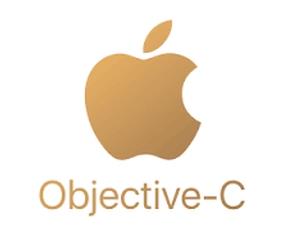
Objective-C is considered one of the principal programming languages used in iOS app development. It’s a superset of the programming language C. Think of it like an added layer on top of C, which makes it very compatible with C++.
Objective-C is also very well established. It dates back to the early 80s, which makes it one of the most robust programming languages for coding. It’s tried and tested, and supported by the vast majority of Apple devices.
As the name implies, it deals with objectives. If an app is a collection of discrete objectives, then Objective-C is the perfect handler.
Some of the advantages of C include:
- Support for encapsulation, data hiding, abstraction, polymorphism, and inheritance
- Support for exception handling as well as operator overloading
- Legacy support for object-oriented programming.
Objective-C has a very similar structure to C, so it’s also very easy to learn for programmers.
2. SWIFT

Swift is a more recent language than Objective-C, as it was only developed in 2014. However, due to its more recent design and architecture, it’s more efficient and more powerful than C++, Java, or Objective-C. Swift was built to make coding much easier for iOS development.
Some of the features in Swift used to make iOS app development more efficient include:
- Advanced Control Flow
- Memory-safe and type-safe feature
- Effective error handling
- Functional programming
- Inferred type object support
Swift also includes improved safety protocols and generics compared to Objective-C. Apple has begun to rely more on Swift for app development as it is. Apple itself says that Swift is 2.6 times faster than Objective-C. Hence, many newer iOS app developers rely on Swift. According to a Digital Skills Survey done by BrainStation, Swift is poised to overtake Objective-C in popularity.
3. Xcode
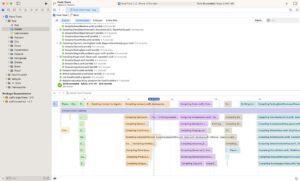
Xcode is known as the preferred IDE and code editor for iOS app developers. It was first released in 2003 by Apple to develop MacOS software. Today, it’s used for all types of Apple device software including their TVs and watches. Xcode includes a suite of tools which can be used to code, test, and debug apps. It can also work on interface design.
Xcode assists developers in cross device development with these tools:
- Instrument Analysis Tools
- SDKs
- Custom Instruments for Code Analysis
- SwiftUI and Interface builder
- Swift, C/C++, Objective-C Compilers
The Xcode IDE also includes support for a wide range of languages other than Swift and C variants. These include Java, AppleScript, Python, Ruby, and ResEdit. Xcode also has support for a variety of models including API Cocoa, C-based API Carbon, and Java. So, as you can see, Xcode is invaluable because of its inclusive nature for so many different types of developers. It’s one of the most useful iOS mobile app development technologies.
4. Flawless
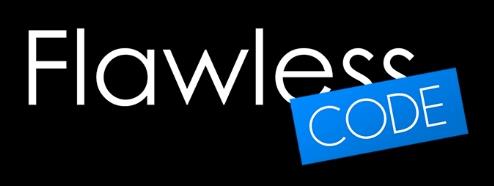
Flawless is a tool for developers to handle tasks like iOS design, analysis and comparison. The tool supports dynamic design and motions and animations. There is also a feature that takes animated screenshots. Flawless is also embedded with Xcode, which makes it a familiar tool for iOS developers. Flawless also has a lot of accessibility options including Zeplin files and Quick Hotkeys. It also supports long-screen designs. Since it’s configured with Xcode, there is also no extra setup required like third-party linking.
5. RxSwift

RxSwift is a source of libraries for Swift. This allows for programmers and developers to quickly add the functionality they need. RxSwift is based on reactive programming. It uses functional type operators which support event based and asynchronous code.
Asynchronous programming improves app performance and responsiveness. The reason for this is the code structure and architecture employed by RxSwift. It allows for code to react and process data in a very clean, sequential way. It allows code to run in parallel, and so increases code functionality.
6. AlamoFire
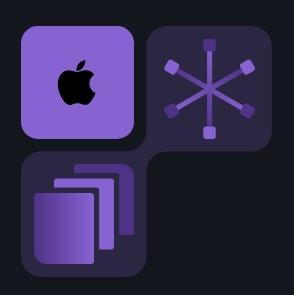
AlamoFire is another code library for iOS app developers. What makes this one of the most important iOS mobile app development technologies is its difference in interface. It is an HTTP network based library separate from Apple’s networking stack. Based completely on Swift, the library handles web requests and responses in both iOS and MacOS. It also includes JSON parameters and response serialization, authentication services, and network enhancement. AlamoFire has been enhanced through the years with various other libraries for newer and more powerful functionality additions.
7. Parse
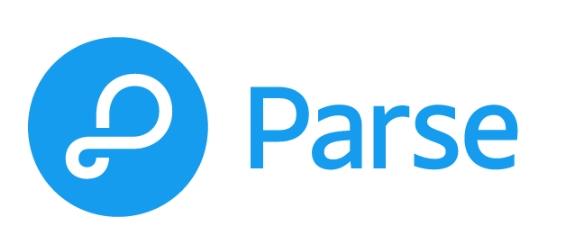
Finally, let’s talk about Parse. This is an open source platform which offers a mobile backend as a service. Parse was originally open sourced by Facebook, but is now owned completely by a programmer community. It has its own documentation, community forum, and blog.
Parse allows developers to store their data in the cloud and manage dashboards and push notifications. It also allows developers to run their custom code in the cloud.
Other backend functionalities include:
- Cloud-based object and file storage
- Social media integration
- Identity log-ins
- Parse analytics and hosting
- Custom code creation in the backend.
These tools are filled with incredible functionality for developers to create, customize, and deploy their apps. iOS app development is made ever more inclusive and easier by these tools. Languages like Swift and Objective-C are linked to so many other classic languages, and Xcode is integrated with app development tools.
Parse is a very capable backend tool, and AlamoFire and RxSwift provide so many functionality libraries without needing third-party integration. These technologies are some of the best for iOS mobile app development.
Let Luminous Tec be your guide to building your app. Message us today and let’s get started!
